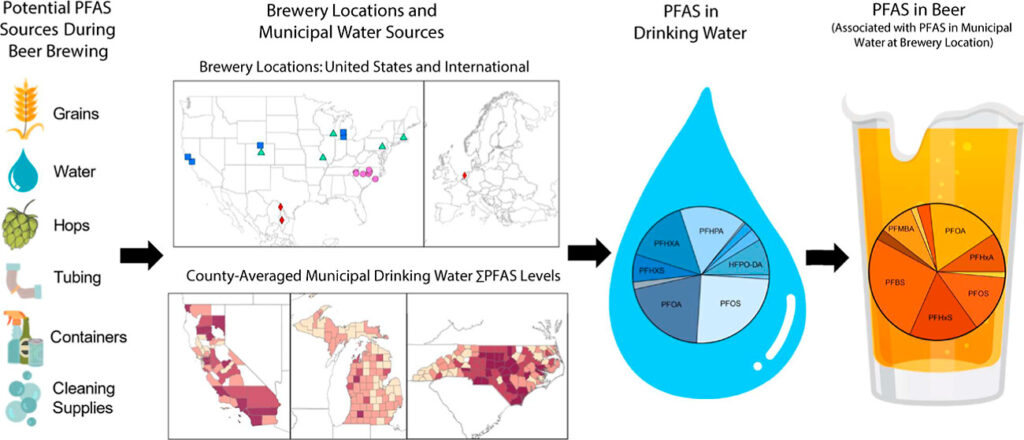PFAS in Beer: What Breweries and Beer Lovers Should Know
Elevated levels of forever chemicals have been found in popular beers across the United States. A 2025 study analyzed 23 different beer samples and found at least one type of PFAS in almost every beer, with some exceeding the EPA’s maximum contaminant level (MCL).
Beers with the highest levels of forever chemicals were brewed in Michigan, California and North Carolina, especially within the Cape Fear River Basin area. Imported beers from Holland and Mexico showed lower levels and likelihood of PFAS.

Beer is the third most popular drink in the world, with recipes stretching back to ancient Mesopotamia over 13,000 years ago. Today, craft and macro breweries produce roughly 6 billion U.S. gallons of beer annually as the market grows and evolves. Water is a key ingredient in beer and, when contaminated, can greatly influence the quality of the end product.
What Are PFAS, and Why Are They Called “Forever Chemicals”?
PFAS, short for per- and polyfluoroalkyl substances, are a large group of manmade chemicals noted for being extremely resistant to breaking down in the environment or human body. Many home and commercial products are made with PFAS, including nonstick cookware, waterproof and stain-resistant clothing, food packaging, cleaning products, fire-fighting foam and more.
As a result of their heavy use, these forever chemicals are widespread in the environment and bodies of water — water which is used to brew beer.
The EPA CompTox database currently lists over 14,000 unique types of PFAS, with PFOA, PFOS and GenX posing increasing concerns for their toxicity and links to serious health problems including cancer and developmental issues. According to the EPA, there is no safe exposure limit to forever chemicals.
How PFAS Are Ending Up in Beer
Water makes up over 90% of beer. When the water is contaminated with forever chemicals, these make their way into the final product. PFAS forever chemicals pose a particular threat because of their stability — they don’t break down during brewing and remain dissolved in water unless specifically removed.
For comparison, other common contaminants (such as chlorine, microbes, sediment) are more easily filtered by water treatment, or reduced or evaporated during boiling, fermentation and other stages of brewing.

Are PFAS in Beer Dangerous? What Science Says
The nearly 15,000 known synthetic forever chemicals are considered harmful to humans long-term in even small amounts. The EPA and EWG’s guidelines indicate no safe level of exposure for PFOA or PFOS, with the maximum contaminant levels (MCLs) for six PFAS compounds at or under 10 parts per trillion (ppt).
One of the risks of forever chemicals lies in their cumulative effect of exposure, especially since only a handful are regulated and tested for. When drinking beer, the same negative health effects of forever chemicals in water are present in your pint.
Some of the health effects of PFAS exposure include disrupted hormone and thyroid function, compromised immune system, increased likelihood of certain cancers, raised cholesterol, liver damage and decreased fertility in men.
Forever chemicals accumulate in your vital organs over time and can take 15+ years to break down in your body. Beer companies are not currently required to disclose PFAS levels, though if you know the water source used for brewing, you can check the EWG’s PFAS contamination map, which shows forever chemical levels by municipality in the U.S.
What This Means for Breweries
Breweries can take the guesswork out of water quality with reliable treatment that specifically targets forever chemicals. Cleaner beer means greater trust with consumers and a higher quality end product.
Forever chemicals are not detectable by taste or smell, though the health impacts are lasting and a rising concern for many.

What About Brewing Equipment?
PFAS can persist in tanks, pipes, hoses and other brewing equipment, leading to recirculation of the contaminants, as standard sanitization won’t typically remove PFAS. Despite this, forever chemicals rarely cause direct damage to brewing equipment as they are not acidic or caustic.
Can PFAS Be Removed From Brewing Water?
Yes and no. No contaminant can be verifiably removed at 100% from water, although with reverse osmosis purification and ultrafiltration you can come very close to total elimination.
How Breweries Can Protect Themselves and Their Customers
Getting high-quality water is more important than ever, in a world where contaminants like forever chemicals are widespread, and in a time when consumers are increasingly health conscious.
Breweries can safeguard their beer from PFAS by installing commercial-grade water systems specifically designed for breweries to target these harmful compounds. Regular testing is also important to monitor PFAS and other contaminant levels in brewing water.

Invest in a Commercial-Grade Water Treatment System
Reverse osmosis water purification is one of the best ways to target forever chemicals. At Kinetico, our commercial RO systems can reduce PFAS up to 99% in high capacities, while maximizing water conservation for 24/7 operations.
Contact our team for a free consultation to see how an innovative, non-electric water system can improve your brewing efficiency and significantly reduce forever chemicals.
Test Water Regularly
Routine water analysis is one of the best, most effective ways to know exactly what’s in your water and the types of treatment required to get water at its optimal level for brewing. Over-the-counter water tests have limited effectiveness on a commercial scale, which is why many breweries choose laboratory-grade scientific analysis working with reputable water experts.
Water quality fluctuates over time, whether from a well or municipal source. Routine testing provides a real-time insight into your water and beer so you can make adjustments without compromise.
Educate Staff & Consumers
Forever chemicals and the health and safety risks of beer are popular topics. Breweries looking to improve their competitive advantage and offer higher-quality products can use this opportunity to keep staff and customers informed.
Experience the Kinetico Difference in Every Pour
From water testing to industry-leading, non-electric water systems, improve your water quality and reduce PFAS exposure with Kinetico. We offer custom water treatment solutions for breweries, restaurants and a variety of commercial industries, as well as for home owners, so you can enjoy cleaner, worry-free water. Get started today with a free consultation.
